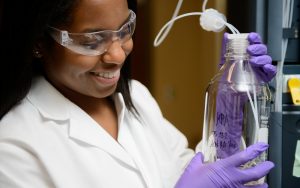
TUSCALOOSA, Ala. — The University of Alabama’s College of Human Environmental Sciences will expand its menu of graduate programs in the fall with a new doctoral program in human nutrition.
The goal of the program is to provide students with the skills needed to perform bench-to-bedside-to-community research that advances the field of nutrition to improve human health. It was designed to align with the goals and objectives of the National Institutes of Health’s National Center for Advancing Translational Sciences.
Dr. Jeannine Lawrence, chair of the department of human nutrition and hospitality management, credits growth in two key areas for contributing to the program’s addition.
“Our master’s degree program has grown exponentially over the past decade, and a significant amount of those students wanted to go on and earn their Ph.D.,” said Lawrence. “We also simultaneously have experienced a growth in the number of faculty researchers.
“Since I arrived at UA in 2007, we have quadrupled the number of active nutrition research faculty, and they are receiving strong external grant funding. This gives our doctoral students a wide variety of mentors and research projects to choose to work with.”
The push for the doctoral program started four years ago with full support from Dr. Milla Boschung, dean of HES. The infrastructure was strengthened last year with the completion of a state-of-the-art translational nutrition lab in Russell Hall.
“We are very excited about the translational aspect of the program,” said Lawrence. “This program will give students a strong foundation in bench research methodology and teach them how to translate that research to help patients and the community.”
While the program’s core is nutrition, it will also place an emphasis on communication. Doctoral candidates will be required to teach a course and will be assessed on their performance. They will also take courses in how to present research to various audiences, including the community and scientists.
“I wish there had been a Ph.D. program of this emphasis and scope when I was a student,” said Lawrence. “The integration of basic, clinical, and community nutrition research methods into a cohesive doctoral program sets up our graduates to make a strong and positive impact on the health of the population for generations to come.”
Contact
Bryant Welbourne, UA Strategic Communications, bryant.welbourne@ua.edu, 205-348-8325
Source
Dr. Jeannine Lawrence, jlawrence@ches.ua.edu, 205-348-6252
